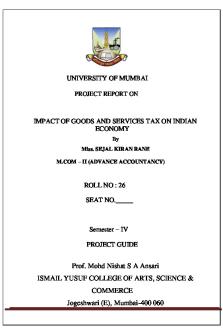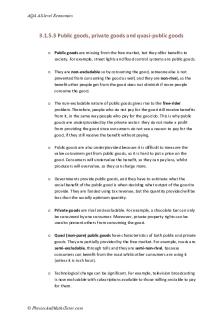Goods and Services supplied in different industries PDF

| Title | Goods and Services supplied in different industries |
|---|---|
| Author | Nick Fonmanu |
| Course | Business Operations Management |
| Institution | Western Sydney University |
| Pages | 2 |
| File Size | 49.7 KB |
| File Type | |
| Total Downloads | 67 |
| Total Views | 147 |
Summary
Goods and Services supplied in different industries...
Description
Goods and Services supplied in different industries Products can be classified in many ways, but the most basic distinction is whether the product is a good or service. The differences between the two have important influences on how operations are carried out. It is important to note that the job of an operations manager will be different in different industries Goods Goods are tangible – that is they are physical items that can be touched and felt such as cars and books. To produce goods operations management is usually concerned with the transformation of raw materials using labour and energy. The role of operations management when producing goods is to transform resources such as raw materials and parts using human labour and or machinery. A key issue is getting the balance between material inputs, human labour, and machinery right to produce goods as efficiently as possible. When producing goods, the operations manager must also take into account: -
Storage and management of raw materials How to store and manage goods Decreasing faults in the transformation process Increasing efficiency (decreasing waste) Increasing production speed
Standardised or customized goods will also impact the decisions made by operations management. This can change from an assembly line style production method to a more-labour intensive method. Goods also differ by industry. Industries that produce goods include those such as textiles (clothing), auto, and agriculture. The nature of goods varies across each industry, as does, therefore, the role of operations management. Of course, each different good has its own requirements.
Services Services are outputs of the production process that consist of the performance of an activity or task for the customer, such as teaching or hairdressing. To produce services, management is usually concerned with converting human labour and knowledge.
Services are intangible – but the effects on the customer should be noticed. Customers do not pay for a physical object they can feel and use; they pay for someone to do something for them. The role of operations focusses on transforming human labour and knowledge (such as a hairdressers skills) into a service to provide to customers. This is quiet different to managing raw materials and equipment because knowledge is intangible. There are challenges for operations management in timing and producing consistent output for services compared to goods. This is because services cannot be stored, once your hair is cut you cant put the cut on the shelf for use later. In service based industries operations managers will be concerned with: -
Customer service to boost satisfaction Speed of service Customisation Training of employees...
Similar Free PDFs

Week 3 Goods and Services Tax
- 20 Pages

Different perspectives in life
- 4 Pages

The American supplied
- 1 Pages

Loyalty in financial services
- 69 Pages
Popular Institutions
- Tinajero National High School - Annex
- Politeknik Caltex Riau
- Yokohama City University
- SGT University
- University of Al-Qadisiyah
- Divine Word College of Vigan
- Techniek College Rotterdam
- Universidade de Santiago
- Universiti Teknologi MARA Cawangan Johor Kampus Pasir Gudang
- Poltekkes Kemenkes Yogyakarta
- Baguio City National High School
- Colegio san marcos
- preparatoria uno
- Centro de Bachillerato Tecnológico Industrial y de Servicios No. 107
- Dalian Maritime University
- Quang Trung Secondary School
- Colegio Tecnológico en Informática
- Corporación Regional de Educación Superior
- Grupo CEDVA
- Dar Al Uloom University
- Centro de Estudios Preuniversitarios de la Universidad Nacional de Ingeniería
- 上智大学
- Aakash International School, Nuna Majara
- San Felipe Neri Catholic School
- Kang Chiao International School - New Taipei City
- Misamis Occidental National High School
- Institución Educativa Escuela Normal Juan Ladrilleros
- Kolehiyo ng Pantukan
- Batanes State College
- Instituto Continental
- Sekolah Menengah Kejuruan Kesehatan Kaltara (Tarakan)
- Colegio de La Inmaculada Concepcion - Cebu











